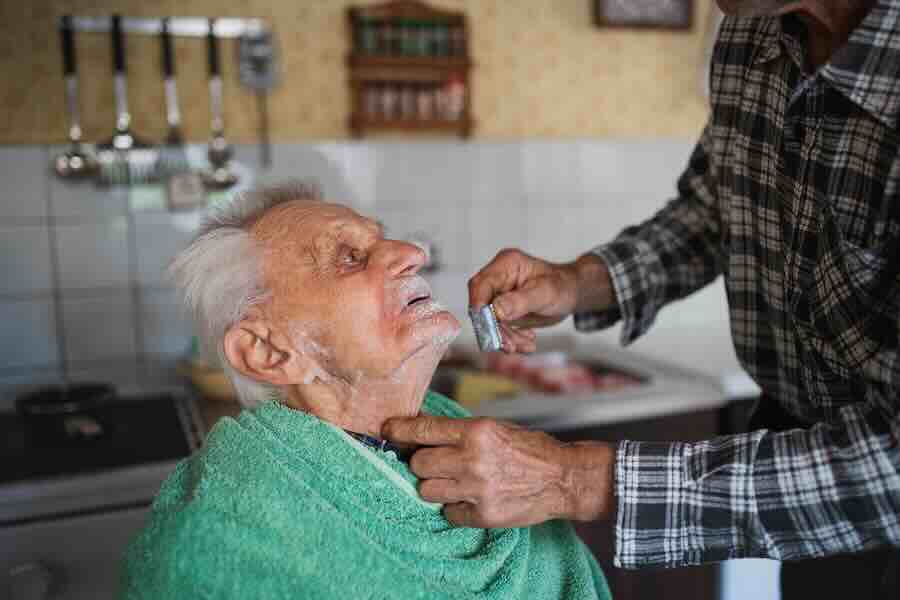Taking care of an aging or ill loved one can be an incredible honor and act of love. But let’s be honest — it’s not easy. While it can be deeply rewarding, the day-to-day tasks can take a toll physically, emotionally, and mentally.
When you’re caring for an aging loved one, it’s easy for the stress to pile up, turning into what’s commonly known as “caregiver stress” or “caregiver burnout.” This happens when the demands become so overwhelming that you feel exhausted, frustrated, or even helpless. Sometimes family caregivers are so busy with caretaking that they don’t even realize the impacts on their own health. They just know that their energy levels are dipping or that it’s become more challenging to provide the care they want to give. Mental health struggles in caregivers are extremely common. Recognizing the signs of caregiver burnout is key to keeping yourself and your loved one supported.

Challenges Only the Caregivers Understand
Let’s dive into the challenges you might face as a family caregiver and some tips on how to handle them. And at the end of this post, we have a brief caregiver burnout quiz to help you further identify signs of caregiver stress.
Physical Exhaustion
Caregiving can be demanding on your body. Helping with mobility, daily chores, and personal care tasks can leave you feeling wiped out. It’s important to recognize when you’re pushing yourself too hard. Sharing the load with family or hiring some help can make a big difference. Also, don’t underestimate the power of taking regular breaks to recharge.
Emotional Turmoil
Feeling a mix of emotions is normal. Guilt, grief, and anxiety can become regular companions. Maybe you feel guilty for wanting a break, or maybe you feel sad seeing your loved one decline. Maybe you’re wondering whether it might be time to start considering hospice care, but you’re overwhelmed or unsure. It’s important to acknowledge these feelings. Don’t hesitate to reach out for help from friends, counseling, or support groups. Talking it out with people who get it can be incredibly healing.

Isolation and Invisibility
When you’re caring for an ill or aging loved one, you might feel an isolation that only the caregivers understand. Caregiving can take up so much of your time that you aren’t able to do things you used to enjoy. And to add to this, you might feel invisible — like others don’t notice your efforts and sacrifices. Without support, you might feel like you’re losing who you are in your caregiving role.
If this sounds like you, you’re not alone. Building a network of support can help these mental health struggles in caregivers. Whether it’s a local group or an online community, connecting with others who understand your experience can be a lifeline. When it’s time to consider hospice care, Envision Hospice can help you get the level of support that you need.
Financial Strain
Caregiving can strain your finances, from medical expenses to cutting back on work hours. Look into resources like government programs or financial counseling to help ease this burden. Having open conversations with family about money matters can also help distribute responsibilities more fairly.

Decision-Making Pressure That Only the Caregivers Understand
Making important health decisions can be stressful. Whether it’s choosing treatments or planning end-of-life care, these choices weigh heavily. Try to have open discussions with your loved one about their wishes, and lean on healthcare professionals for guidance. Here at Envision Hospice, we’re always available to answer your questions and help you get the information and support you need.
Mental Health Struggles in Caregivers
Constant stress in the background can lead to anxiety, depression, or burnout. Taking care of your mental health is crucial. Even small self-care routines, like a walk or meditation, can make a big difference. Don’t hesitate to seek professional mental health support. You deserve care and support.
Family Dynamics and Uneven Responsibility
Family dynamics can complicate caregiving. When responsibilities aren’t shared equally, tensions can rise. Open, honest communication is key. Family meetings to discuss caregiving duties can help, and sometimes, involving a mediator or counselor can ease the process.
Practical Advice for Support and Resources

Finding support is vital. Here are some options to consider:
- Professional In-Home Care: Hiring professionals can give you a much-needed break and ensure quality care for your loved one.
- Hospice Services: Envision hospice services provide comprehensive support to meet needs only the caregivers understand. Hospice focuses on comfort and quality of life for both patients and families.
- Local Community Services: Check out local services like meal delivery, transportation, and adult day care in your area to lighten the load.
- Educational Resources: Learn about your loved one’s condition and care needs. Also, make sure you pay attention to common mental health struggles in caregivers to get the support you need. Being informed empowers you to make better decisions.
Wondering if you might be experiencing caregiver stress? Here’s a quick quiz to help identify some of the signs.
Caregiver Burnout Quiz
For each statement below, rate how often you experience the described feeling or behavior using the following scale:
– 0 – Never
– 1 – Rarely
– 2 – Sometimes
– 3 – Often
– 4 – Always
1. I feel exhausted, even after a full night’s sleep.
2. I experience frequent headaches or other physical pains.
3. I feel irritable or angry with my loved one or others around me.
4. I find it difficult to concentrate or make decisions.
5. I feel sad or hopeless about my situation.
6. I have lost interest in activities or hobbies I once enjoyed.
7. I withdraw from friends, family, or social activities.
8. I feel unappreciated or unsupported by those around me.
9. I have trouble sleeping or experience changes in my sleep patterns.
10. I feel overwhelmed by the responsibilities that only the caregivers understand.
11. Mental health struggles in caregivers: I experience frequent anxiety or worry about the future.
12. I find myself neglecting my personal health or self-care.
13. I use alcohol, drugs, or food to cope with stress.
14. I have conflicts with family members about caregiving duties.
15. I feel trapped or want to escape my caregiving role.
Scoring Your Caregiver Burnout Quiz Results
– 0-15: You are likely managing well, but it’s important to remain mindful of your stress levels and practice self-care.
– 16-30: You may be experiencing moderate caregiving stress. Consider seeking support from friends, family, or support groups to help alleviate some of the burden.
– 31-45: You are likely experiencing significant stress and could be at risk for burnout. It’s important to prioritize self-care and reach out for professional help or respite care options.
– 46-60: You might be experiencing severe burnout. Seeking immediate support from healthcare professionals, counselors, or support services is highly recommended to protect your well-being and that of your loved one.
Remember: Physical, emotional, or mental health struggles in caregivers are common. Acknowledging stress and seeking help is a strength, not a weakness. Taking steps to care for yourself is essential to continue providing the best care for your loved one.

Supporting Needs That Only the Caregivers Understand
In the end, caregiving, while challenging, can also be a path to personal growth and deeper connection. By acknowledging the hurdles and reaching out for support, you can navigate this journey with resilience and compassion. Remember, you’re not alone, and help is out there for you every step of the way.

